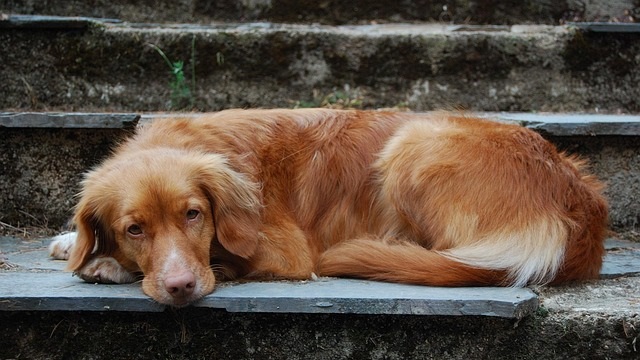Dog Breathing Heavy While Sleeping: Causes & When to Worry
A dog breathing heavy while sleeping is not uncommon; most of the time, it’s completely normal. The dog might be dreaming, it might be exhausted, or it might be panting to reduce body temperature.
However, besides these normal reasons that shouldn’t worry you, some should push you to ask, “Why is my dog breathing heavy while sleeping?”
If that’s where you are now, this blog is ideal for you as we’ll explore the most common causes for heavy breathing. You’ll also learn about the red flags that should get you to act quickly and how Maven Pet can help you be proactive by actively monitoring your pup with the help of technology.
- Normal Causes — Heavy breathing can be normal due to dreaming, excitement, and temperature regulation during sleep.
- Health Concerns — Obesity, pain, respiratory issues, and heart conditions may lead to concerning heavy breathing.
- Signs to Watch — Labored breathing, increased respiratory rate, persistent panting, and changes in breathing patterns require veterinary attention.
- Proactive Monitoring — The Maven Pet Monitor helps track your dog's health and detect abnormalities early.
Causes for Dogs Breathing Fast While Sleeping
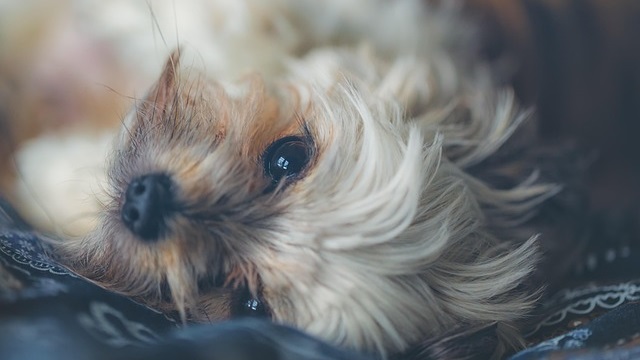
So, is it normal for dogs to breathe heavily while sleeping? Yes, in most cases, it is, and here are the reasons why:
- Dreaming — Dogs experience REM sleep like humans, meaning they also dream. When that’s happening, it’s perfectly natural for the pup’s breathing to become faster and irregular. The heavy breathing is also typically associated with twitching, whimpering, and leg movements.
- Excitement — If your pooch went to sleep feeling excited from physical exertion, you shouldn’t be surprised if its breathing remains faster in the first 15 minutes or so. Once the body calms down, you’ll likely hear them breathing normally.
- Temperature regulation — Since dogs don’t sweat like us, they pant. This can also happen at night if the pup’s body temperature is too high. If the temperature around them is comfortable, they’ll likely stop soon after their temperature drops sufficiently.
“I got the Maven sensor for my 14-year-old Chihuahua mix with heart and trachea issues. It gave me back peace of mind – I can track her RRR, BPM, drinking, and activity anytime and know instantly if something’s wrong. Highly recommend!”
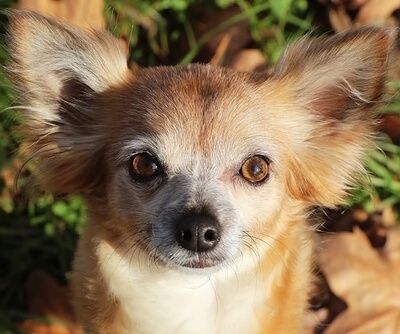
★★★★★
Chiara De Luca
Titti
- Sleeping position — If your dog sleeps in certain positions, they could start breathing more heavily. This is common when they sleep on their back, which could put more pressure on their diaphragm. However, this is not overly common.
- Faster respiratory rate in puppies — Yes, puppies tend to have a quicker respiratory rate than adult dogs, mainly because of their constant growth and speedier metabolism. Their resting respiratory rate is 15–40 breaths per minute, compared to the normal breathing rate for dogs of 10–30 breaths. This can sometimes lead them to breathe heavily during sleep.
Related Conditions
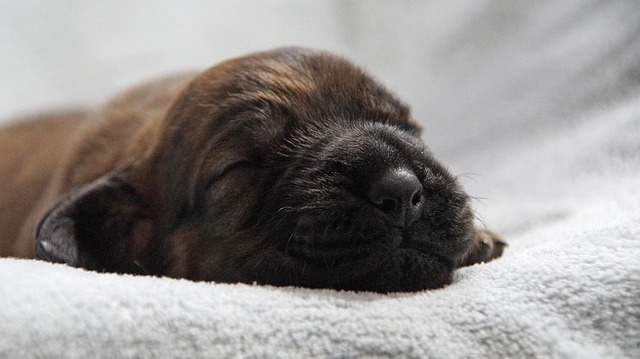
Various reasons for heavy breathing in the night are connected to some underlying health conditions, including:
- Obesity — A weightier dog breathing heavily while sleeping is uncommon. It’s also a sign that you should consider getting them to lose weight to be in optimal health.
- Heat exhaustion, heatstroke — If your dog overheated during the day, they could breathe heavily while sleeping to reduce their body temperature.
- Pain — If your dog is experiencing pain, you shouldn’t be surprised if it breathes more heavily at night.
- Respiratory issues — Respiratory problems like bronchitis, pneumonia, and asthma can lead to heavy breathing during sleep. The same goes for most other lung-related diseases.
- A heart condition — Heart failure leads to fluids building up in the lungs, further leading to breathing issues and heavier breathing at night.
- Anemia — A lower number of red blood cells can lead to a faster breathing rate because the body is trying to get more oxygen.
When to Worry: Signs of a Serious Issue
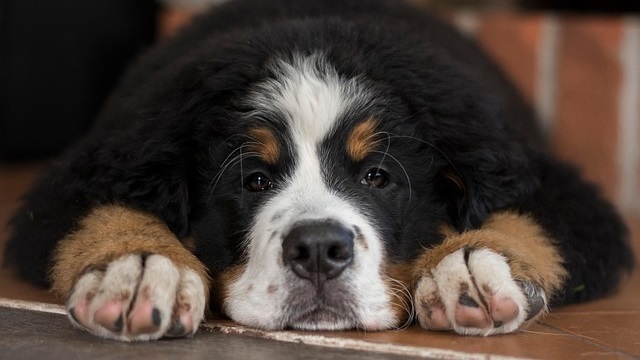
Although heavy breathing at night is often normal, sometimes it can be a cause for concern. Here are some signs that could point to a more serious issue, which should lead you to react by visiting the vet to see what’s going on:
- Labored breathing — Dyspnea in dogs is when they struggle to breathe, which can come with exaggerated abdominal or chest movements. If you see your pup struggling, visiting the vet is best.
- Higher resting respiratory rate — If your dog’s breathing rate is higher than 30-40, you should take them to the vet to see why that’s the case.
- Constant panting — Panting during sleep or while awake is normal, but if it becomes persistent and lasts longer, it might be connected to a more serious issue.
- Changes in breathing patterns — As you’ve seen, most short bursts of irregular breathing are often normal, but if you see a change in the pattern, it could be a cause for concern.
Other patterns and symptoms that should prompt you to act include persistent weakness, lethargy, wheezing, coughing, pale and blue gums, appetite loss, restlessness while sleeping, and nasal discharge.
How to Monitor Your Dog’s Breathing
Now that you know the answer to “why is my dog panting at night?” and when to take them to the vet, it’s time to think about how to prevent all of this. Staying proactive can be very beneficial because it will help you notice health issues earlier in their stage, leading you to act before they worsen.
To do that, you can use our pet smart collar to monitor your dog’s vitals and behavior. Changes in both can point toward underlying issues, and you’ll be prompted to act on time.

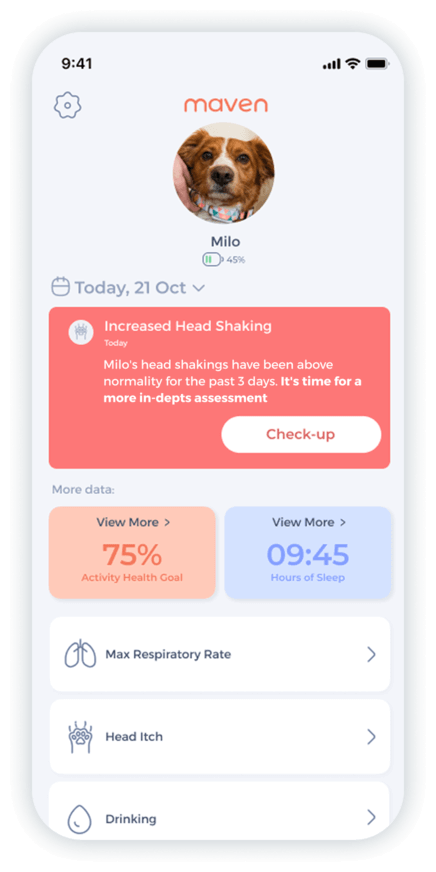
Monitor heart rate, respiratory rate, activity & rest, drinking, itch behavior.
The Maven Pet Monitor makes staying proactive about our dog’s health easy, and the most essential feature in the case of heavy breathing is the respiratory rate tracker. The device measures the rate automatically, and you can check the numbers anytime in our dedicated app.
The remaining real-time health tracking features are more than helpful for pet wellness as they enable you to follow various vitals and spot behavioral changes or abnormal patterns on time.
Bottom Line
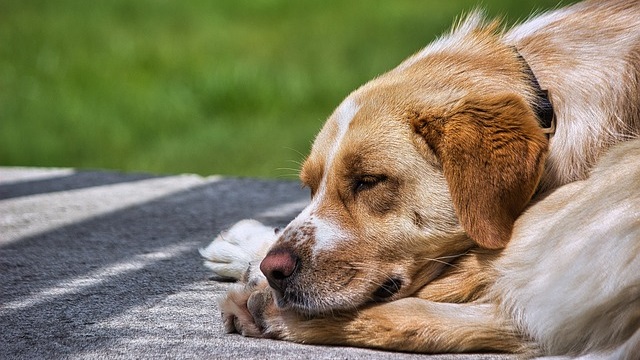
Most instances of a dog breathing heavy while sleeping are largely harmless, especially when they last briefly. However, sometimes, especially when the heavy breathing persists, it can be a red flag pointing toward a health issue that you should act upon by visiting the vet.
The good news is that modern technologies let you stay proactive with your dog’s health. The Maven Pet Health Monitor does just that as it enables you to continually monitor your pup’s vitals and behavioral changes. Subscribe to our service to get your collar and track your puppy’s health.
Maven Pet focuses on improving the quality of life of our pets with technology, using artificial intelligence (AI) to enable proactive pet care. By accurately collecting and monitoring pet data 24/7 and flagging any irregularities, Maven Pet empowers pet parents and veterinarians to stay ahead of potential health issues, ensuring the well-being and longevity of our beloved companions.

